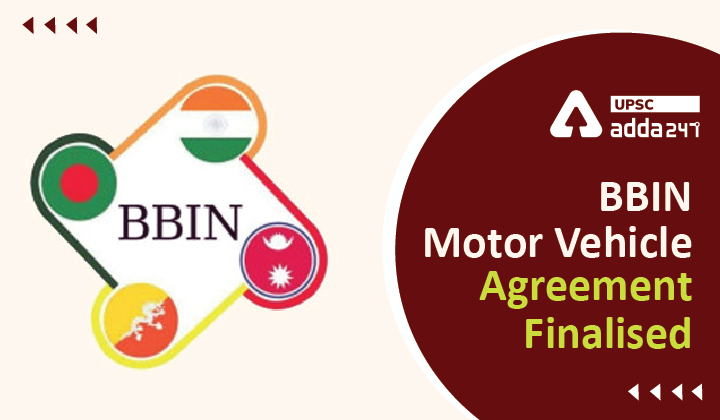Table of Contents
BBIN UPSC: Relevance
- GS 2: Bilateral, regional and global groupings and agreements involving India and/or affecting India’s interests.
BBIN initiative: Context
- Recently, India, Bangladesh and Nepal finalised an Memorandum of Understanding (MoU) for implementing the Bangladesh-Bhutan-India-Nepal (BBIN) Motor Vehicles Agreement (MVA) that is aimed at boosting regional trade and connectivity.
BBIN MVA: Key points
- Bhutan participated in the meeting as an observer and the MoU was finalised “pending ratification of the MVA by Bhutan”.
- The original BBIN MVA was signed by all four countries in June 2015. However, Bhutan objected the proposal over sustainability and environmental concerns.
- The Bhutanese parliament then decided not to endorse the plan, and former Prime Minister Tobgay Tshering’s government agreed to allow the other three countries to go ahead with the project for vehicular movement (BIN-MVA) in 2017.
- In 2020, Prime Minister told that given Bhutan’s “current infrastructure” and top priority to remaining a “carbon-negative” country, it would not be possible to consider joining the MVA.
- While India remained “hopeful” that Bhutan could change its position on the project, it was decided at a meeting in November 2021 to go ahead for now, given that there are no new signals from Bhutan on the project.
What is BBIN initiative?
- The BBIN economic project aims at constructing an economic corridor connecting Bangladesh, Bhutan, India and Nepal by roads.
- The BBIN connectivity project was conceived after South Asian Association for Regional Cooperation (SAARC) failed to agree on a regional motor vehicles agreement at a summit in Nepal in 2014, mainly because of opposition from Pakistan.
BBIN importance
- BBIN is a step towards improving the economic situations of these South-Asian countries through regional cooperation.
- The BBIN agreement was created ‘for the Regulation of Passenger, Personal and Cargo Vehicular Traffic between Bangladesh, Bhutan, India, and Nepal and improve the quality of transportation between these neighbouring countries also aiding the economy.
- The corridor will enhance connectivity between goods, people and support easier transportation.
- It will also act as resistance towards growing influence of China in the region as well as portray a strong front regarding sub-regional South-Asian unity.
BBIN initiative: Key aspects
- Member states would be permitted to operate their vehicles in each other’s territory for transportation of cargo and passengers.
- To enter a neighbouring country’s territory, all cars would need an electronic permit, and border security measures across nations’ borders would remain in place.
- Cargo vehicles will be allowed to enter any of the four countries without the requirement for products to be transferred from one truck to another at the border.
- Cargo trucks are tracked electronically, permits are granted online, and permits are delivered electronically to all land ports under the system.
- Every time the container door is opened, an electronic seal on the vehicle informs authorities.
Read current affairs for UPSC





 TSPSC Group 1 Question Paper 2024, Downl...
TSPSC Group 1 Question Paper 2024, Downl...
 TSPSC Group 1 Answer key 2024 Out, Downl...
TSPSC Group 1 Answer key 2024 Out, Downl...
 UPSC Prelims 2024 Question Paper, Downlo...
UPSC Prelims 2024 Question Paper, Downlo...





